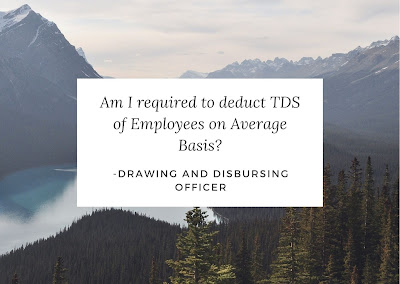Tax Deduction at Source (TDS)
-Dr. Lalit Kumar Setia*
During the discussions with the Drawing and
Disbursing Officers (DDOs), it is observed that the DDOs are always ready to
learn new skills to cope up with the advanced tools of computing an accurate
amount of TDS and submission of the same. They continuously work for containing
corruption by enforcing the financial rules at their workplaces. It is rightly
said, "If you think you are too small an entity to play any role in the
fight against corruption, think of the potential of an atom".
The
DDOs are usually not cooperative with the people doing bad things in their life
and ask to have favored in wrong works including financial irregularities. Sh.
Mahatama Gandhi rightly pointed out, "Non-cooperation with evil is as much
a duty as is co-operation with good".
Tax Deductions at Source:
Every year, the tax deductors face problems in deducting an accurate amount of tax from the income of employees. The employees are expected to submit the documents of income tax savings (deductions or exemptions) to the Drawing and Disbursing Officers (DDOs). There are employees who are fairly computing and deposit the income tax not only on Salaries but also on other incomes, it is expected that all employees report the accurate amounts of other incomes and deductions, they are entitled as per the income tax act. Every employee should be aware of the provisions of the income tax act and its consequences for the concealment of income.
Why deduct the TDS of employees on an average basis?
Most of the deductors face practical issues while deducting the TDS of the employees on an average basis. The employees insist to deduct the TDS less than the average amount. As per provisions of the Income Tax Act, it is mandatory to deduct the accurate amount of tax in the proper way on an average basis i.e. equal installment in each month of the year by the employer as Tax Deduction at Source (TDS) under section 192 of Income Tax Act and the same is required to be deposited in each month to the Income Tax Department.
Is it required to have proof of savings to allow deduction of section 80C?
This is the duty of an employee to communicate timely to the Drawing and Disbursing Officer (DDO) about the deductions, he wishes to claim during the annual financial year. He can submit in writing the amount he will definitely deposit for claiming deduction of section 80C, saving income tax on it. Each employee should submit proofs of savings, payment of rent (if any), payment of NPS (if any), and other documentary evidence. In case, the proof is not provided and he also has not submitted it in writing, then the Drawing and Disbursing Officer should not entertain deduction under section 80C except for the amount he deducted from the salaries of the employees which are also covered in section 80C such as GPF, GIS, NPS, etc.
Claim for Tax Deductions:
In case, such declarations are not made with desired proofs, the employers may deduct the Tax Deduction at Source (TDS) keeping into mind, the incomes of the employees as per accounting records, and the same is shown in Form 16 or Annual Information Statement (AIS). Thereafter, if excess payments in form of TDS are deducted then the employee can claim the deductions or exemptions at his or her level while filing Income Tax Return (ITR) and the refund is processed from Income Tax Department.
What proofs are desired from an employee?
The Drawing and Disbursing Officer (DDO) works on behalf of the Income Tax Department and collects the proof for each deduction claimed by the employee.
Documents to claim Deduction of Section 80C:
In the case of Equity Linked Saving Schemes of Mutual Funds, LIC Premiums, PPF Contribution, NPS contributions, an employee can submit the receipts of such investments or entries of such payments in the bank’s passbook.
In the case of Tuition Fees, it is required to submit the receipts of schools.
Documents to claim Deduction of Section 24:
If the loan has been taken to buy a home; then hard copies of all relevant documents will have to be submitted to claim a deduction of Rs. 50000 p.a. (Interest on Loan) till the loan is repaid u/s 24 of Income Tax Act.
Documents to claim Exemption on HRA:
To claim relief from Tax on HRA, an employee has to submit PAN of Landlord, however, if the annual rent payment is less than or equal to 1 Lac (i.e. 8333 per month) then it is not required to submit PAN of Landlord. But a copy of the rent agreement or declaration by the landlord along with ownership proof of landlord of rented premises (i.e. house tax receipt or latest electricity bill) has to be provided to the employer.
Documents to claim Deduction of Section 80D:
In case of claiming deduction u/s 80D, it will be required to provide a receipt or digital transaction details to the employer.
The employees should prepare the details and provide documentary proofs so that excess tax cannot be deducted from the salaries.
*Copyright © 2018 Dr. Lalit Kumar. All rights reserved.
This article is written by Dr. Lalit Kumar Setia; a renowned author and trainer. He completed his Doctorate in Commerce from Kurukshetra University Kurukshetra and MBA in Information Technology from GJU, Hisar. He also wrote two books, 15 research papers, and organized more than 200 Training Courses during his working period since 2006 in Haryana Institute of Public Administration, Gurugram. The article was firstly published in 2018 and last updated on 19th October 2021. The writer can be contacted on lalitkumarsetia@gmail.com
More Articles:
and
















